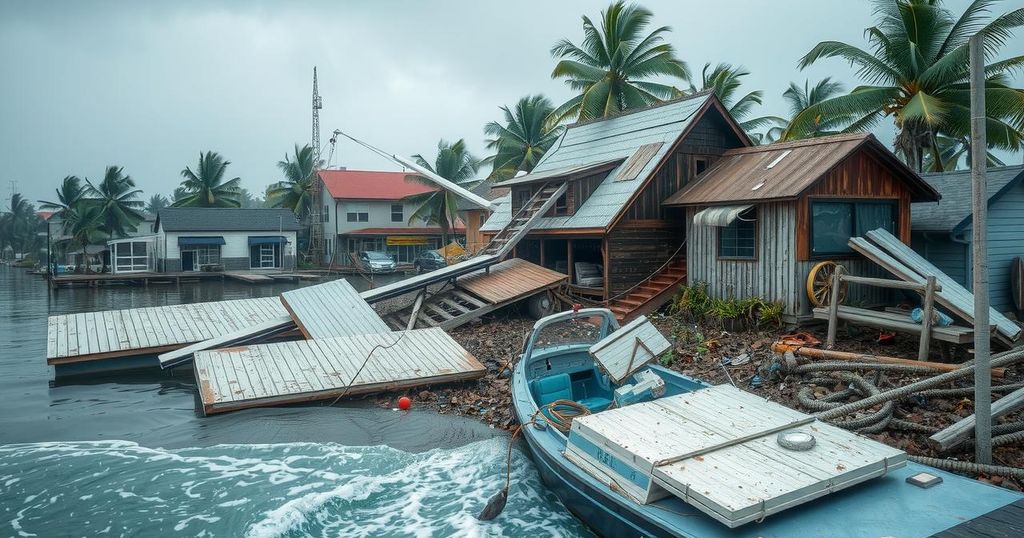Devastation of Tropical Cyclone Chido: Urgent Climate Action Needed

Tropical Cyclone Chido has ravaged Mayotte with catastrophic winds and destruction, sparking a humanitarian crisis with increasing death tolls. Concurrently, the Biden administration faces pressure to finalize key environmental policies as the incoming Trump administration poses risks to clean energy initiatives. Global efforts, like the COP16, have stalled, and rising sea levels are sinking Miami condos. Overall, these developments illustrate the critical urgency for coordinated climate action and policy responses.
Tropical Cyclone Chido has inflicted catastrophic devastation on the small island region of Mayotte, which is situated in the Indian Ocean, between Madagascar and the eastern coast of Africa. This natural disaster struck on Saturday, reaching Category 4 status with winds at 136 mph, marking the strongest storm to hit the islands in nearly a century. Initial reports indicate a tragic loss of life, with at least 14 confirmed fatalities and expectations that this number could escalate. The impacts are particularly severe in slum areas, home to many undocumented migrants, highlighting the storm’s disproportionate effects on vulnerable populations. Eyewitness accounts depict scenes of unparalleled destruction, with local business owners noting that “there is nothing left” and likening the devastation to an atomic bomb blast. In particular, entire neighborhoods have been obliterated, and critical infrastructure has been severely compromised, threatening the survival of many residents in the wake of this disaster.
In parallel developments, President Biden’s administration is engaging in a flurry of last-minute environmental policy initiatives as his term nears conclusion. The Energy Department’s Loan Programs Office is facing pressure to solidify substantial commitments for clean technology projects amid the looming transition to a potentially less environmentally-focused administration under President-elect Trump. This includes a $6.6 billion loan to Rivian and a $7.5 billion loan for a joint battery plant between Stellantis and Samsung. As Trump’s team suggests future cuts to electric vehicle support and tightening regulations on Chinese imports, the future of U.S. clean energy initiatives remains precarious.
Furthermore, the recent UN COP16 summit concluded without an agreement on addressing land degradation and drought resilience, leaving poorer nations without the necessary commitments for support from wealthier countries. The lack of progress echoes similar failures from past climate conferences, as noted by environmental experts. In another alarming finding, a study has revealed that numerous beachfront condos in Miami are sinking at unexpectedly rapid rates due to various contributing factors, including potentially rising sea levels—signaling urgent need for monitoring and analysis concerning coastal infrastructure.
Lastly, a research report has indicated that this year’s typhoon season in the Philippines was “supercharged” due to climate change, resulting in a significant uptick in storm activity and associated fatalities and economic losses. These events collectively underscore the pressing need for immediate and comprehensive climate action.
Tropical Cyclone Chido serves as a stark reminder of the increasingly severe weather events fueled by climate change. Hurricanes and cyclones are becoming more intense as global temperatures rise, causing humanitarian crises in vulnerable regions. The storm’s impact on Mayotte highlights the dire consequences faced by marginalized communities, particularly those without adequate resources or infrastructure. Simultaneously, the political landscape in the United States is shifting, with the incoming administration potentially reversing critical environmental policies established by the Biden administration. This situation places clean energy initiatives at risk during a pivotal moment in climate action. The UN’s failure to secure binding agreements during the COP16 highlights broader challenges in global climate negotiations, especially concerning funding for drought resilience in developing countries. Additionally, infrastructural issues, such as those experienced by Miami’s beachfront condos, emphasize the pressing realities of rising sea levels and coastal erosion as symptoms of climate change. The intertwining of these events illustrates the urgent need for coordinated efforts to address climate change, mitigate its effects, and protect vulnerable populations.
In conclusion, Tropical Cyclone Chido’s devastating impact on Mayotte not only highlights the immediate dangers posed by extreme weather events but also reflects the larger context of climate change’s growing threat to vulnerable populations worldwide. As political shifts in the U.S. threaten commitments to clean energy and environmental sustainability, the repercussions of inadequate climate policies could be severe. Furthermore, global initiatives continue to falter in providing necessary support for the most affected regions. This holistic understanding of interconnected climate challenges stresses the urgent need for comprehensive measures to combat climate change, safeguard lives, and secure ecological stability.
Original Source: heatmap.news






